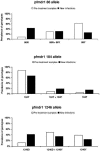Selection of Plasmodium falciparum pfmdr1 alleles following therapy with artemether-lumefantrine in an area of Uganda where malaria is highly endemic
- PMID: 16641472
- PMCID: PMC1472234
- DOI: 10.1128/AAC.50.5.1893-1895.2006
Selection of Plasmodium falciparum pfmdr1 alleles following therapy with artemether-lumefantrine in an area of Uganda where malaria is highly endemic
Abstract
Polymorphisms in the Plasmodium falciparum pfmdr1 gene were assayed in pretreatment samples and in samples from patients reinfected following therapy with artemether-lumefantrine. The pfmdr1 alleles 86N, 184F, and 1246D significantly increased in prevalence after treatment. All samples had a single pfmdr1 copy. Treatment with artemether-lumefantrine selects for polymorphisms that may alter antimalarial drug response.
Figures
References
-
- Cattamanchi, A., D. Kyabayinze, A. Hubbard, P. J. Rosenthal, and G. Dorsey. 2003. Distinguishing recrudescence from reinfection in a longitudinal antimalarial drug efficacy study: comparison of results based on genotyping of msp-1, msp-2, and glurp. Am. J. Trop. Med. Hyg. 68:133-139. - PubMed
-
- Duraisingh, M. T., P. Jones, I. Sambou, L. von Seidlein, M. Pinder, and D. C. Warhurst. 2000. The tyrosine-86 allele of the pfmdr1 gene of Plasmodium falciparum is associated with increased sensitivity to the anti-malarials mefloquine and artemisinin. Mol. Biochem. Parasitol. 108:13-23. - PubMed
-
- Duraisingh, M. T., C. Roper, D. Walliker, and D. C. Warhurst. 2000. Increased sensitivity to the antimalarials mefloquine and artemisinin is conferred by mutations in the pfmdr1 gene of Plasmodium falciparum. Mol. Microbiol. 36:955-961. - PubMed
Publication types
MeSH terms
Substances
Grants and funding
LinkOut - more resources
Full Text Sources
Medical


